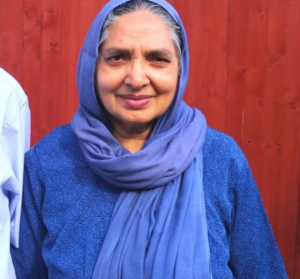People in West Midlands urged to act now as 1-in-10 adults could be living with diabetes by 2030
Almost one in 10 people in the West Midlands could have diabetes by 2030 amid alarming levels of obesity, according to a new study. People are being urged to prevent or delay the onset of Type 2 diabetes ahead of World Diabetes Day on Sunday 14 November.
Diagnoses of diabetes have doubled in the last 15 years, and analysis by Public Health England estimates that 514,943 people (prevalence of 10.2%) in the West Midlands are likely to be living with diabetes before the end of the decade.
About 90% of diabetes patients have Type 2, a condition that is more likely to develop if people are overweight. Extra weight, gained as people lived through the COVID pandemic, means people are at higher risk of developing Type 2 diabetes.

Harsimer urges all those at risk to take action ahead of World Diabetes Day
Anyone at high risk may be eligible to join their local Healthier You: NHS Diabetes Prevention Programme, a joint initiative from NHS England and NHS Improvement, Public Health England and Diabetes UK.
Harsimer, aged 66 from Tipton, is a wife to husband Surjit Singh and mum to three children. She started the NHS Diabetes Prevention Programme in August 2020. For the recently retired shop owner, the programme has provided Harsimer with an opportunity to better understand how her body works. “I learnt what causes high blood pressure, high cholesterol and how to control it,” said Harsimer.
Ingeus Health Educator, Aqib, delivers the NHS Healthier You programme in the Hindi language which Harsimer found to be of immense benefit. “With a language barrier, it helped me to learn more as it was in Hindi. Joining with my husband was nice. With him being a Type 2 diabetic for 30 years, he was also able to learn things.
“I learnt about the sizes of portions and how to cook healthily using the right types of oil. I learnt about what we eat and how it can affect diabetes. I don’t have too many fizzy drinks and I have reduced my sugar intake”.
For anyone considering the programme, Harsimer and her husband say, “If you take it seriously, you will feel better for it. The Hindi speaking programme can give you a lot of information. It can really help the Asian community who suffer from diabetes.”
Professor Vinod Patel, Clinical Director Diabetes NHS England & NHS Improvement in the Midlands, said the study showed why people should come forward for help.
“There has never been a more crucial time to lose weight, exercise more and eat more healthily, so I would urge all those at risk to take action on World Diabetes Day.
“Our increasing waistlines, reduced physical activity and maybe less attention to a healthy diet may have increased the risk of developing Type 2 diabetes. The good news is that the NHS’s highly successful, world-leading diabetes prevention programme is helping people like Harsimer take small common sense steps to get control of their own health.
“If you think you are at risk of Type 2 diabetes, would like more information on the Healthier You: NHS Diabetes Prevention Programme or have any other concerns related to your health, please contact your GP. You can also complete the Diabetes UK ‘Know Your Risk’ tool (https://riskscore.diabetes.org.uk/start) to register yourself onto a free local Healthier You: NHS Diabetes Prevention Programme session.”
